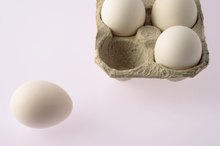Can You Gain Muscle on a Low Calorie Diet?
The human body is naturally designed to shed muscle when it experiences a severe caloric deficit, and gain muscle in a caloric surplus. However, it is possible to gain muscle on a low calorie diet under certain conditions. If you carry a significant proportion of body fat, maintain a reasonable caloric deficit, consume ample protein and train with weights, you will gain muscle over time.
Moderating Your Caloric Deficit
Since it is impossible to grow muscle on an extremely low calorie diet, make sure your caloric deficit is reasonable. Start by calculating your basal metabolic rate, as follows:
Female: 655 + ( 4.35 x weight in pounds ) + ( 4.7 x height in inches ) - ( 4.7 x age in years ) Male: 66 + ( 6.23 x weight in pounds ) + ( 12.7 x height in inches ) - ( 6.8 x age in years )
Basal metabolic rate only accounts for the calories burned by your idle body, so you'll have to apply the Harris Benedict Multiplier to account for your individual level of daily activity. If you're sparsely active, multiply by 1.375. If you're moderately active, multiply by 1.55. If you're highly active, multiply by 1.725. Now, ensure that your diet falls no more than 500 daily calories short of this number.
- Since it is impossible to grow muscle on an extremely low calorie diet, make sure your caloric deficit is reasonable.
- If you're moderately active, multiply by 1.55.
Protein Intake
The Difference Between Muscle Milk & Muscle Milk Collegiate
Learn More
To gain muscle on a caloric deficit, you'll have to give your body as much nutritional help as possible. Since protein contains amino acids -- the building blocks for human muscle tissue -- this means ingesting a high proportion of protein. The International Society of Sports Nutrition recommends that you consume 1.6 grams of protein for each kilogram of body weight. If necessary, you may use a powdered protein supplement to help reach this quota.
- To gain muscle on a caloric deficit, you'll have to give your body as much nutritional help as possible.
Weight Training
To stimulate muscular growth in a caloric deficit, you'll have to maintain an intense weight training program. Aim to train at least three times per week, hitting all major muscle groups at each training session. For a sample session, perform the following exercises: bench press, shoulder press, row, squat and deadlift. For each exercise, perform three to four sets of eight to 12 repetitions for maximum muscular hypertrophy.
- To stimulate muscular growth in a caloric deficit, you'll have to maintain an intense weight training program.
- For each exercise, perform three to four sets of eight to 12 repetitions for maximum muscular hypertrophy.
Other Lifestyle Considerations
How Much Protein Do You Need When Lifting Weights?
Learn More
The use of alcohol and other recreational drugs can inhibit muscular synthesis, particularly when the body is under the stress of a caloric deficit. Avoid these substances as much as possible.
Related Articles
References
- Endocrinology and Metabolism: Inhibition of muscle protein synthesis by alcohol is associated with modulation of eIF2B and eIF4E
- Journal of the International Society of Sports Nutrition; International Society of Sports Nutrition Position Stand: Protein and Exercise; B. Campbell et al.
- buffguy900
- BurningHeart
- thebarbarianway
Writer Bio
Daniel Nikolas began writing professionally in 2010. He has extensive knowledge in the areas of health and fitness, with certifications in personal training, sports nutrition and standard first aid. Nikolas is pursuing a Bachelor of Arts with honors in political science and history from McGill University.









